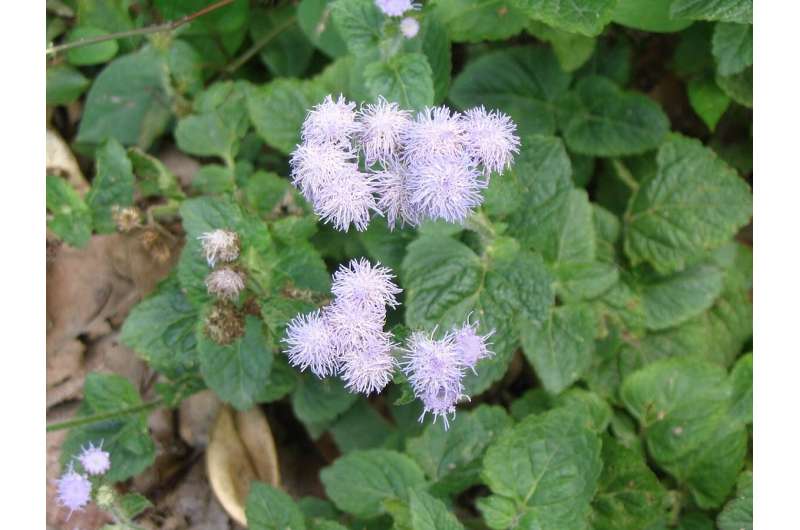Toxic, invasive weed finds value as organic fertiliser

The toxic, invasive herb Ageratum conyzoides, or billy goat weed, can be bio-converted into nutrient-rich compost for crop cultivation, says a new study.
Published March in the journal Biomass Conversion and Biorefinery, the study found the compost environmentally safe and ideal for use as soil conditioner to improve farmlands.
Krishna Chaitanya Maturi, an author of the study and researcher at the Indian Institute of Technology (IIT) Guwahati, says that the adverse impact of the A. conyzoides weeds, especially in degrading soil quality by reducing useful soil organisms, is well documented. The invasive weed, commonly referred to as billy goat weed and chick weed, is a native of South America.
"It is an extremely toxic plant which contains various toxic allelochemicals such as stigmasterol, demethoxy-ageratochromene, and caryophyllene due to which A. conyzoides is harmful to neighboring crops. It also disrupts various aboriginal plant cultures in diverse ecological regions," Maturi tells SciDev.Net.
Ajay S. Kalamdhad, co-author and professor of Environmental Engineering at IIT, says that the study aimed to produce a non-toxic product by biologically treating the plant, blending it with inoculums (combination of microorganisms and organic matters) and bulking agents in a rotary drum composter.
"The composter was competent in increasing nutritional parameters such as nitrogen, phosphorus and potassium while decreasing lignin, hemicelluloses and cellulose," says Kalamdhad. "The utilization of A. conyzoides for the in-vessel composting technique is a novel approach for getting a value-added product, which is rarely reported in other management technologies."
According to Kalamdhad, statistical analysis showed close relationship between biodegradation and nutritional products, following composting. "As a result, the study suggests that A. conyzoides compost can be used in a variety of farming applications that require a nutrient-rich, non-toxic product that is environmentally acceptable," he added.
According to an FAO paper, the value of A. conyzoides in boosting soil fertility is part of indigenous knowledge among farmers in the mid-hills of Arunachal Pradesh. The paper explains that farmers in Arunachal Pradesh believe that the plant can be used to increase rice grain yields through improving the chemical properties and fertility of soils.
K.C. Jisha, an assistant professor at the Muslim Education Society College in Kerala who was not involved in the study, says the findings would be of value to agro-industry policymakers looking for effective weed management strategies. "The compost of A. conyzoides can be used as a substitute for chemical fertilizers," she tells SciDev.Net.
The Ageratum species of plants are part of the aromatic herb family, Asteraceae.
R. Seema Devi, a researcher specializing in the phytochemistry of aromatic medicinal herbs and assistant professor at the N.S.S. College, Manjeri, Kerala, says: "Plants in the [Asteraceae] family are rich in bioactive compounds like polyphenols, terpenoids and flavonoids and their essential oils have long been used [in traditional medicines such as for skin diseases and diarrhea]."
"A. conyzoides is an annual herb used in folk and ethnobotanical medicine to treat skin diseases, diarrhea and gynecological problems. Studies have shown it to have anti-microbial, anti-inflammatory, anti-malarial and other properties."
More information: Krishna Chaitanya Maturi et al, Insights into the bioconversion of Ageratum conyzoides into a nutrient-rich compost and its toxicity assessment: nutritional and quality assessment through instrumental analysis, Biomass Conversion and Biorefinery (2022). DOI: 10.1007/s13399-022-02532-y
Provided by SciDev.Net



















